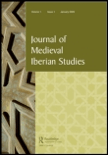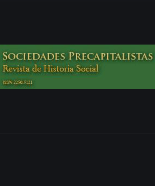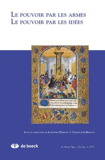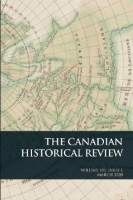
Studia Historica-Historia Medieval
Scope & Guideline
Fostering Global Dialogue on Medieval Insights
Introduction
Aims and Scopes
- Cartulary Studies:
A significant focus on cartularies, the medieval documents that record charters and privileges, emphasizing their historical importance and methodological approaches to their study. - Feudalism and Vassalage:
In-depth exploration of feudal systems, vassal contracts, and the dynamics of power and loyalty among nobles and monarchs during the medieval era. - Cultural Interactions and Diversity:
Research on religious plurality and interreligious contacts, examining the coexistence and interactions between Christian, Muslim, and Jewish communities. - Economic and Social History:
Investigations into economic practices, trade networks, and social structures, providing insights into the financial systems and societal hierarchies of the medieval world. - Political History and Governance:
Analysis of political structures, governance, and the role of women in medieval politics, highlighting the complexities of power dynamics in various regions. - Regional Studies:
A consistent focus on specific regions, particularly the Iberian Peninsula, examining local histories and their broader implications within the medieval context.
Trending and Emerging
- Interdisciplinary Approaches:
There is a growing trend towards interdisciplinary studies that combine history with anthropology, sociology, and cultural studies to provide a more nuanced understanding of medieval societies. - Environmental History:
An emerging interest in the intersection of history and environmental studies, examining how medieval societies interacted with their landscapes and the implications of these relationships for contemporary environmental issues. - Women's Studies in Medieval Contexts:
Increased focus on the roles and experiences of women in medieval society, moving beyond traditional narratives to explore their influence on politics, economy, and culture. - Digital Humanities:
The integration of digital methodologies in historical research is becoming more prominent, enabling new forms of analysis and presentation of medieval data. - Global Perspectives on Medieval History:
A trend towards incorporating global histories and comparative studies that place the Iberian experience within a broader, transnational context, reflecting the interconnectedness of medieval societies.
Declining or Waning
- Islamic Influence on European Culture:
Although still relevant, the focus on the Islamic influence on medieval European culture has decreased, with more emphasis being placed on local histories and specific socio-political structures. - Traditional Military History:
The traditional narrative of warfare as a primary focus is waning, as scholars are increasingly interested in the socio-economic and cultural implications of military actions rather than just the events themselves. - Archaeological and Material Culture Studies:
Research pertaining to archaeological findings and material culture is less prevalent compared to textual and documentary analysis, indicating a shift towards more interpretive historical methodologies.
Similar Journals

Drevnyaya Rus-Voprosy Medievistiki
Cultivating Knowledge of Eastern European HeritageDrevnyaya Rus-Voprosy Medievistiki is a prestigious journal published by INDRIK that focuses on the rich tapestry of medieval studies, particularly centered around the history and culture of Ancient Rus. With its ISSN 2071-9574, this journal aims to contribute significantly to the academic discourse surrounding medieval historiography, archaeology, and cultural studies through original research, comprehensive reviews, and scholarly articles. Although it does not currently operate under an open access model, Drevnyaya Rus remains a vital resource for researchers and students interested in the complexities of medieval civilization. Located in Moscow, Russia, the journal seeks to foster a deeper understanding of Eastern European history and its implications on contemporary society. By providing a platform for rigorous scholarship, it plays a crucial role in expanding the knowledge base within the field of medieval studies, thereby catering to the interests of historians, archaeologists, and cultural theorists alike.

Espacio Tiempo y Forma-Serie III-Historia Medieval
Illuminating the Past: Your Gateway to Medieval InsightsEspacio Tiempo y Forma-Serie III-Historia Medieval, published by the Universidad Nacional de Educación a Distancia (UNED), is a prominent open-access journal dedicated to advancing research in medieval history. Since its establishment, this journal has gained a significant reputation within the academic community, achieving Q1 rankings in both Classics and History, reflecting its commitment to high-quality scholarship and insightful contributions to the field. With a remarkable Scopus ranking of 36th in Classics and 589th in History, it places itself among the top-tier publications, ensuring visibility and impact for its authors. Open access since 2011, the journal promotes the dissemination of knowledge to a broader audience, enhancing academic engagement and fostering collaboration among researchers globally. With its rich resources, the journal attracts a diverse readership, including historians, students, and professionals keen on exploring innovative perspectives in medieval studies.

Zbornik Radova Vizantoloskog Instituta
Advancing Scholarship in Classics and HumanitiesZbornik Radova Vizantoloskog Instituta is a distinguished open-access journal published by the Institute of Byzantine Studies, Serbian Academy of Sciences and Arts, located in Belgrade, Serbia. Since its inception in 2003, this journal has served as a vital platform for the dissemination of scholarly research in the fields of Classics, History, Linguistics and Language, and Literature and Literary Theory. Although it currently holds a Q4 ranking in the 2023 category quartiles, its commitment to fostering academic discourse and research accessibility is unwavering. The journal features a diverse range of articles that explore the complexities and nuances of Byzantine studies and related disciplines, catering to a broad audience of researchers, professionals, and students dedicated to the humanities. With a focus on both historical context and contemporary perspectives, Zbornik Radova Vizantoloskog Instituta aims to contribute significant insights into the academic community while promoting scholarly interaction on a global scale.

Journal of Medieval Iberian Studies
Advancing Knowledge in Medieval Iberian CultureThe Journal of Medieval Iberian Studies is a leading academic journal published by Routledge Journals, Taylor & Francis Ltd, dedicated to exploring the diverse and rich tapestry of medieval Iberian history and culture. With its ISSN 1754-6559 and E-ISSN 1754-6567, this journal serves as a vital resource for scholars engaged in the fields of cultural studies and history, attaining a prestigious Q1 ranking in both categories as of 2023. The journal is recognized for its significant contribution to the humanities, featuring peer-reviewed articles that foster innovative research and critical discourse on medieval Iberia from 2010 to 2024. Spanning an array of topics, it encapsulates interdisciplinary approaches to medieval studies, making it an essential publication for researchers, professionals, and students alike who seek to deepen their understanding of this pivotal period in history. Although it currently does not offer open access options, the journal is committed to advancing scholarly discussion and knowledge dissemination within the academic community.

Magallanica-Revista de Historia Moderna
Exploring the Tapestry of Modern HistoryMagallanica-Revista de Historia Moderna is an esteemed academic journal dedicated to advancing the field of modern history, published by UNIV NACIONAL MAR DEL PLATA, FAC HUMANIDADES. Since its transition to an Open Access format in 2015, it has broadened the accessibility of cutting-edge research to scholars and enthusiasts around the globe. With an ISSN of 2422-779X, this publication focuses on significant historical developments, cultural exchanges, and the socio-political transformations that have shaped contemporary society. Nestled in the vibrant city of Mar del Plata, Buenos Aires, Argentina, the journal aims to foster scholarly dialogue and critical analysis among researchers, professionals, and students alike, providing a vital platform for innovative ideas and diverse perspectives in modern historiography. As the journal continues to evolve, it invites contributions that explore the trends, methodologies, and interdisciplinary approaches essential to understanding our shared past.

Sociedades Precapitalistas
Bridging Past and Present Through Scholarly InsightSociedades Precapitalistas, published by the Universidad Nacional de La Plata, Faculty of Humanities and Educational Sciences, is a distinguished academic journal that specializes in the study of pre-capitalist societies, exploring their structures, cultures, and dynamics. With an ISSN of 2250-5121 and an E-ISSN of 2250-5121, this Open Access journal has been committed to disseminating knowledge since 2011, ensuring that research is accessible to a global audience. Set in La Plata, Buenos Aires, Argentina, the journal serves as a vital platform for researchers, professionals, and students engaged in this niche yet significant field of study. Although specific impact metrics such as H-Index are currently unavailable, its dedication to academic rigor and the relevance of its subject matter highlight its importance for those exploring the socio-economic histories of societies prior to the capitalist era. As the discourse surrounding global history continues to evolve, Sociedades Precapitalistas plays a crucial role in enriching our understanding of past societies and their legacies.

Codex Aquilarensis
Connecting Past Narratives with Contemporary PerspectivesCodex Aquilarensis is a distinguished academic journal published by FUNDACION SANTA MARIA REAL, CENTRO ESTUDIOS ROMANICO, specializing in History and Visual Arts and Performing Arts. With an ISSN of 0214-896X and an E-ISSN of 2386-6454, this journal has carved its niche within the scholarly community in Spain, encompassing a range of topics pertinent to its fields of study. Although it currently holds a Q4 category in both History and Visual Arts and Performing Arts as of 2023, it plays a critical role in disseminating important research and insights from 2015 to 2022, contributing to the academic dialogue around these disciplines. While access options are limited, the journal's commitment to enhancing understanding in the arts and humanities makes it a valuable resource for researchers, professionals, and students alike. Its ranking within Scopus further underscores its relevance, positioning it within the competitive landscape of arts and humanities research. Scholars and practitioners interested in historical and artistic studies are encouraged to engage with the content presented by Codex Aquilarensis as it continues to evolve and contribute to the intellectual heritage of the region.

Magnificat Cultura i Literatura Medievals
Unveiling the Rich Tapestry of Medieval ScholarshipMagnificat Cultura i Literatura Medievals, published by UNIV VALENCIA, SERVICIO PUBLICACIONS, is an esteemed academic journal that has been at the forefront of medieval studies since its inception in 2014. With its Open Access model, this journal ensures that cutting-edge research is readily available to scholars and enthusiasts alike, fostering an inclusive academic environment. Based in Spain, it boasts impressive rankings with a Q2 designation in History and a Q1 in Literature and Literary Theory for 2023, indicating its significant contribution to these fields. The journal is indexed by Scopus, achieving top-tier rankings in both Literature and History, and is recognized in the 87th and 72nd percentiles of their respective categories. With a focus on the complexities of medieval culture and literature, Magnificat serves as a vital resource for researchers, professionals, and students dedicated to exploring the rich tapestry of medieval scholarship.

MOYEN AGE
Fostering Insight into Historical Linguistics and Literary TheoryMOYEN AGE is a distinguished academic journal published by LE MOYEN AGE BOECK & LARCIER S A in Belgium, focused on the multifaceted disciplines of History, Linguistics, and Literature. With its ISSN 0027-2841 and E-ISSN 1782-1436, this journal serves as a platform for researchers, professionals, and students alike to engage with scholarly articles that contribute to the understanding of medieval studies. Although currently categorized in the fourth quartile across various fields as of 2023, MOYEN AGE demonstrates a commitment to fostering academic dialogue and exploration around historical linguistics and literary theory. The journal is available via subscription, making it an essential resource for those looking to deepen their knowledge in its scope, which spans from 2001 through 2024. As it continues to evolve, MOYEN AGE remains a relevant source for emerging thinkers and established scholars drawn to the complexities of the medieval era.

CANADIAN HISTORICAL REVIEW
Fostering Critical Discourse in History and Religion.The Canadian Historical Review serves as a premier scholarly journal dedicated to fostering research and discourse in the fields of history and religious studies, published by the esteemed University of Toronto Press. With an ISSN of 0008-3755 and an E-ISSN of 1710-1093, this journal has been a vital contributor to the academic landscape since its inception, continuing to provide a platform for innovative research and critical analysis from 1978 to the present. Recognized in the Q2 category for both History and Religious Studies in 2023, it ranks in the top tier of its field, positioning itself as an essential resource for scholars eager to explore diverse topics in Canadian history and beyond. While the journal does not currently operate under an Open Access model, it remains highly regarded for its rigorous peer-review process, ensuring the highest standards of academic integrity. The editorial board is committed to expanding the boundaries of historical inquiry, making it a cornerstone for researchers, professionals, and students alike who seek to deepen their understanding of the past.